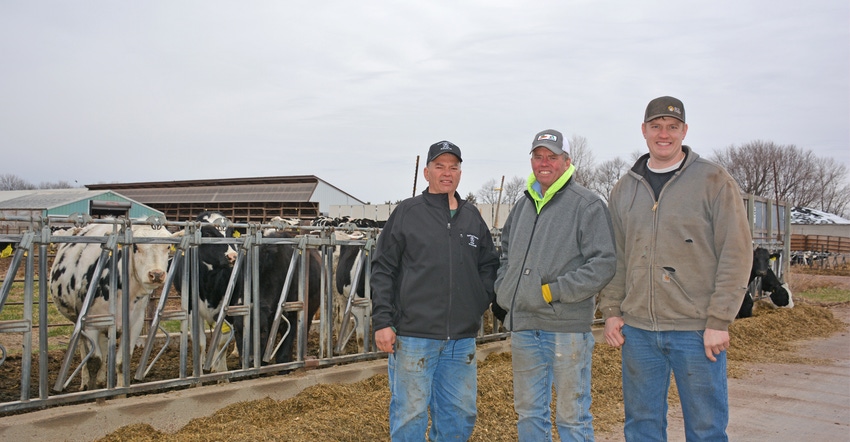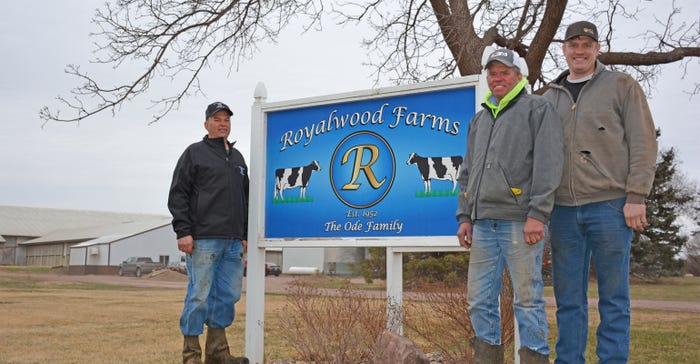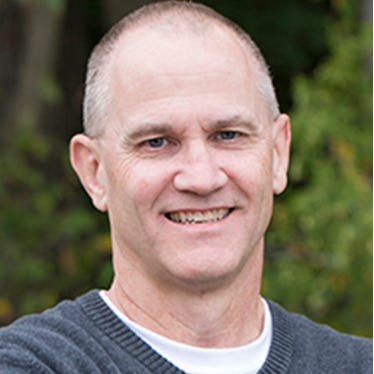
Dairy farming is in the Ode family heritage, traceable to the original homestead in Norway. The U.S. version of the Ode dairy farm is about 3 miles east of South Dakota’s largest city, Sioux Falls, and about 3 miles south of Brandon, S.D.
Brothers Gregg and Doug Ode, and Gregg’s son Alex take that heritage seriously and look to continue what is now called Royalwood Farms. Gregg and Doug are the fourth generation, while Alex represents the fifth generation of Odes to work the farm.
Royalwood Farms, established in 1952, now consists of 480 total cows, with 420 currently milking, and 1,150 acres of corn and alfalfa.
“I’m happy that he’s showing interest in the farm to the point where we have added a little bit more ground,” Gregg says of Alex working into the operation. “And he’s starting to be more of a key player in the business aspect, as far as doing projections for the cash crop inputs.”
Alex graduated from South Dakota State University in 2010 with a degree in dairy production, with business specializations in dairy manufacturing. At the Bel Brand cheese plant in Brookings, S.D., he works an assortment of 12-hour shifts for 183 days out of the year, “so the other days is family and farm.”
Coming into the Ode fold, Alex brings a new dynamic, with new ideas on how to do things. “We have a healthy relationship,” Gregg says of incorporating Alex and his suggestions into the operation. “It’s a give-and-take situation.”
That dynamic is a replay of when Gregg and Doug returned to the farm after graduating from SDSU with dairy production degrees, joining their father, Bob, and mother, Marilyn.
“Dad gave up the reins little by little as he got older, starting about when he turned 70,” Gregg says of Bob, who passed away in July at 90. One of the suggestions that Gregg and Doug brought to the table was to build the facility that now stands.
“It’s nice to get a fresh perspective. A fresh set of eyes does make things better,” Gregg says.
Gregg, 65, and Doug, 62, not only enjoy the dairy life, but also know that Alex is the future. Alex’s sister, Elisabeth, works in banking. Doug’s two sons, Ryan and Eric, are both electrical engineers, and he has two stepsons, Riley and Sam. Alex’s long-term plan is to work full time on the farm and give up his job at Bel Brand.
Value added
In addition to the three Odes, six employees help with milking and care of the cows. The farm does not have robotic milkers or feeders. The Holstein cows are milked three times a day in a double-eight parallel parlor with a rapid exit.
The family has discussed robotic milkers, “but it’s something you’ve got to find a way where it does pencil out,” Gregg says. “We’d have to do some modifications where the cows are housed. There’s a lot of other things that need to be addressed before we would get to that, but it has crossed our minds.”
While robotic milkers might not be in the Odes’ immediate future, they’re still adapting.
Doug, the “genetics guru” of the farm, looks to get the best milking cows possible, as well as those producing valuable replacement heifers. Not all will become great milk cows and not all are heifer calves, but he has a plan for those, even though it goes against his thinking as a dairyman.
“Cows that aren’t producing to their potential and cows that are bred more than three times will be bred to beef. I just can’t believe that I’m breeding cows to beef that are milking 30,000 to 35,000 pounds of milk,” he says. “You want females out of them. But when it comes to economics and you see you can get so much more off of a beef cross than you can off a Holstein steer, it doesn’t take long for you to see, ‘Yeah, that’s the right thing to do.’”
There are three Holstein-Wagyu crosses in the drylot, and Doug has also crossed Holsteins with Angus and Angus-Simmental. “It’s something we’re seeing if we can get a niche market,” Doug says, “something that we’re playing with.”
The Odes are working with the Holstein Association, where Royalwood Farms and a Wisconsin dairy farm collaborate with the University of Wisconsin-River Falls to evaluate four calves resulting from Holsteins crossed with and Angus bulls, as well as four calves from crossing Holsteins with Sim-Angus bulls.
“We’re just looking for a way to add value,” Doug says. “There will always be a place for small dairies if you can develop a niche market that will help you to be able to thrive and still be small. Would we like to get bigger? Sometimes.”
Sharing dairy story
Operating a 480-head dairy so close to a city of almost 190,000 and a bedroom community of just over 11,000, the family prides itself on being good neighbors.
While milk is the “cash crop” for dairies, manure production is a necessary and abundant byproduct. It can also cause rifts in the neighborhood. The Odes try to be conscious of what’s going on with the neighbors and will refrain from spreading manure on days when neighbors are hosting family events.
“We have changed some practices,” Gregg says. One such change is using a dragline to transport lagoon manure to fields rather than tankers heading back and forth from dairy to field. “That has definitely seemed to help from a safety aspect,” Alex says. “We don’t have a quarter-million-pound rig running up and down the road, fighting with traffic and people passing. So that’s definitely helped.”
 DAIRY EDUCATION: Each year, with the exception of 2020 due to the pandemic, the Odes have hosted a breakfast-on-the-farm event, which attracts up to 1,800 people to learn how a dairy operates.
DAIRY EDUCATION: Each year, with the exception of 2020 due to the pandemic, the Odes have hosted a breakfast-on-the-farm event, which attracts up to 1,800 people to learn how a dairy operates.

To reach out beyond their neighborhood, the Odes host a breakfast-on-the-farm event every June for the public. This year’s event is from 9 a.m. to 1 p.m. June 18, and visitors can enjoy a free breakfast and learn how a dairy farm works.
“This is a working dairy farm,” Alex says. “People can come here, have a good breakfast, and they can roam around. Go out by the lagoon if they want; they can go look at the cows and the calves if they want.”
Odes will have people stationed around the farm to make sure visitors are safe, as well as answer any questions. Crowds as high as 1,800 have attended the breakfasts, which are sponsored by AgUnited for Agriculture. School buses are contracted to shuttle visitors from parking lots to the farm. Midwest Dairy will also be giving away free malts.
“It’s good PR, because so much of the younger generation loses that connection,” Gregg says. “They think their milk comes from a grocery store. It’s good for them to come here and see the cows that make their milk, and to see that we truly care for the cows.”
This will be the Odes’ 14th time hosting the event, with only 2020’s cancellation of the breakfast due to COVID-19 breaking their streak.
Royalwood Farms will also be one of the tour sites during the National Holstein Convention held June 27 to July 1 in Sioux Falls.
About the Author(s)
You May Also Like






